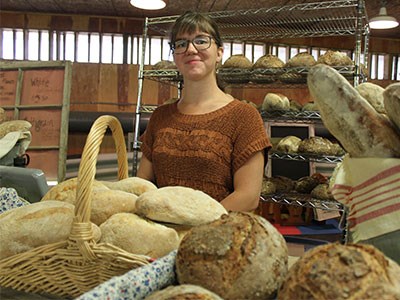On an early Saturday morning at Sault Ste. Marie’s Mill Market, Bethany Higgins fields orders for her freshly baked bread faster than she can bag the loaves. A lineup invariably forms, and her baskets empty long before the market closes for the day. If you want some of this bread, you have to get here early — it’s that good.
Since she and her partner Nicholas launched Stillcroft Farm and Bakehouse on St. Joseph Island, their breads — made with organic ingredients, whole-grain flours and natural leavening processes, before being baked in a wood-fired brick oven — have been flying off the shelves. Now the pair is streamlining its production.
Funding of $5,000 from the Sustainable New Agri-Food Products (SNAP) program enabled the Higgins family to acquire a mixer, an expensive piece of hardware that otherwise would not have been feasible.
“We would never have bought it, because we just set up our business; this is only our fourth month of operation, so we couldn’t have gotten the capital together to justify buying,” Nicholas said. “It’s not a huge amount of money, but it is a fairly significant investment in the business after we’ve already invested in it.”
But the equipment has made the mixing process faster and more manageable. It even has the capacity to tackle tougher bagel and cracker doughs, a goal for the future.
“I was worried because with artisan bread, there’s a lot of flak about using mixers,” Nicholas said. “Some people are pro mixer, and some people are anti-mixer and think it’s better to mix by hand, but I’ve found it’s been better to mix with the mixer than mix it by hand.”
SNAP is an initiative of the Rural Agri-Innovation Network (RAIN), which received close to $240,000 this year from the federal government to help Northern farmers and producers grow their ventures with value-added processes. Individual proponents were eligible for up to $5,000, while collaborative efforts could qualify for up to $15,000.
Additional fund coordinators are located in Rainy River, Timmins and Sudbury and all have a background in agriculture, so they understand the challenges producers face in the North. They’re attempting to spread out the funding to as geographically diverse an area as possible.
“We’ve had startup businesses and established businesses that are just at a critical point for expanding, so it’s been a real range of applicants,” said RAIN market development specialist Katie Filion, who helps administer the program out of the Sault.
Other successful applicants include Emiry’s Berry Patch in Massey, a pick-your-own strawberry patch, which added equipment to make frozen yogurt on site; Belly Ice Cream in Muskoka, which purchased a sorbet-making machine; blueberry producer Level Plains Enterprises Inc. in Wawa, which purchased a food processor and steam kettles so the business could branch out into jams and jellies; and Sprucedale Quality Meats in Muskoka, an abattoir that’s purchased a meat slicer to add beef bacon and sausages to its product line.
“In general, we haven’t had a shortage of applications,” Filion said. “A lot of what we’ve heard is, ‘I’ve wanted to do this for a while and I just haven’t had the cash to do it.’”
Though the program was rolled out this year as a pilot project, David Thompson, research program director at RAIN, said he’s confident they’ve demonstrated the need and benefit for the program. He and Filion are hopeful they can continue to be funded in subsequent years.
Their goal is to continue assisting Northern farmers and producers in increasing Northern food production and gain recognition for their products. Last June, Sault Ste. Marie hosted the inaugural Eat Algoma festival, a one-day street fair featuring food produced locally. Events like Eat Algoma and the Royal Agricultural Winter Fair in Toronto are excellent venues to promote, and gain a following for, Northern products, Thompson said.
“This will really, I think, kickstart a lot of interest in Northern Ontario products, not necessarily here, but across Ontario and even internationally,” he said.
As their business grows, Bethany and Nicholas Higgins will soon need to hire a part-time employee to help with the baking, and they’re already looking to future options, such as selling wholesale, or setting up a community-supported agriculture structure through which customers could purchase weekly bread shares.
“The grant has been great,” Higgins said. “I hate to think where I’d be without it.”




